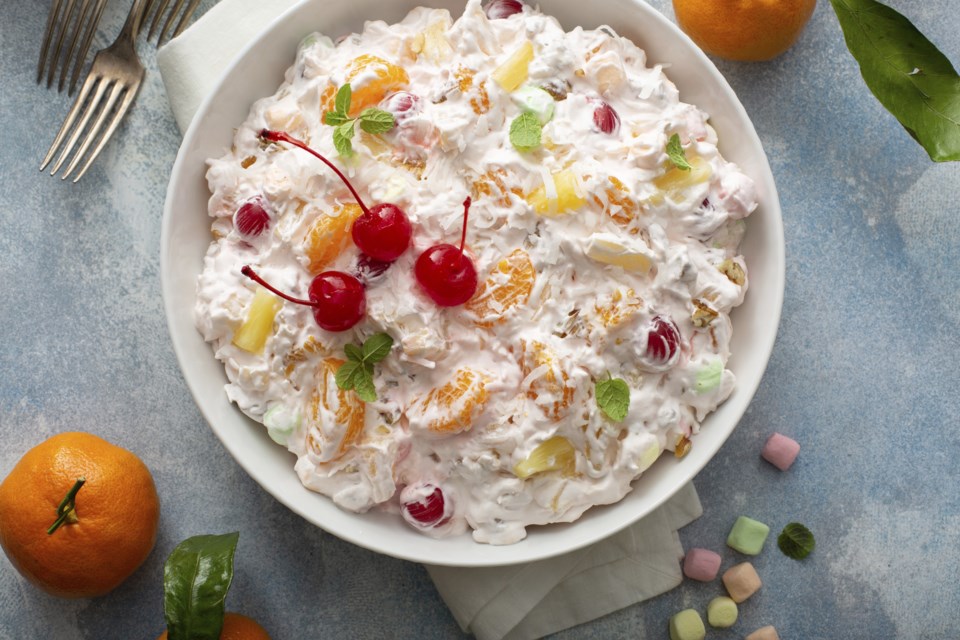NEW YORK (AP) — “My name’s Joyce,” drawls a neighbor to Edward Scissorhands, “and I noticed that you have not tasted any of the that I made especially for you.”
Johnny Depp's character in the 1990 cult film opens wide to receive a giant spoonful of the fluffy pink-tinged fruit confection.
He manages an “mmm” as he chews, but not before viewers are treated to a food-sexy little scene involving Joyce's disembodied hands laboriously preparing the dish, which has a long history and passionate protectors.
Mostly a holiday treat for Easter, Thanksgiving and Christmas, ambrosia of yore was a humble delight. At least when compared to Joyce's version or many of the fluffy parties in fancy bowls seen now on TikTok and Instagram.
In 1867, provided a recipe in her “Dixie Cookery; or, How I Managed My Table for Twelve Years." She counseled readers to , sweetened with a little sugar in alternating layers with pulped oranges.
Godey's Lady's Book and Magazine, founded in Philadelphia, agreed with Barringer's take on ambrosia in 1870, but offered pineapple as a worthy alternative. “Some use both,” the magazine noted, “but it is better with only one fruit.”
Joyce's version, on the other hand, is far busier, involving pineapple, peaches, oranges, heavy cream, yogurt, cherry juice, toasted coconut and chopped pecans. She tops the pile with marshmallows and cherries.
The whole shebang, say purists, is nothing less than an abomination.
“Classic ambrosia consists of oranges and coconut, then sugar to taste,” said James Beard Award-winning chef Virginia Willis in Atlanta. “Ambrosia isn't retro. Ambrosia has never gone out of fashion in the South. I've probably had ambrosia every year of my 56 years.”
Aficionados like Willis feel strongly about their ambrosia, sometimes relying on recipes passed down within families for generations. Willis melds her Southern roots and French culinary training in her cookbooks, including “Bon Appétit, Y'all.”
Among her most cherished childhood memories, she said, “was my grandfather boring a hole in the coconut and turning it upside down to let the water drip into the glass.”
Feelings run hot all along the ambrosia spectrum, starting with the name. It's ambrosia if it's a dessert. It's ambrosia salad when it takes a prideful spot on the table during the main course.
There are other debates.
Coconut: Use it or forget it? Fresh or pre-shredded? Toasted or not?
Fruit: Canned or fresh? One type or several? Drain or use the juices?
Maraschino cherries: Dump in wet, risking a pink tinge to the end result? Drain and pat dry? Hard pass altogether?
Marshmallows: The big ones or the miniatures? The white ones or the multicolored pastels? Leave out because they're gag-inducing?
Whipped cream, cream cheese, sour cream, yogurt, mayo?
In Brooklyn, relied on his Aunt Jessie to lead the way on ambrosia salad. She led him into a vast, more contemporary world of fluff salads made with boxed instant puddings and powdered colored gelatin.
It was Aunt Jessie, Pelosi said, who called her green concoction made with instant pistachio pudding ambrosia salad rather than Watergate salad, as such a thing is more commonly known because, one story goes, it rose in popularity during the Watergate scandal of the 1970s.
“There's so many different ways to do it,” Pelosi said of ambrosia salad. “I make it the way that my family made it, which doesn’t have marshmallows because we didn’t like them.”
Ambrosia was so named for the food of the Greek and Roman gods. Its region of origin is lost to history. Its ties to the South are strong, though some believe it began in Vermont or elsewhere in New England. David Shields, a culinary historian, author and professor at the University of South Carolina in Columbia, has another theory.
“Ambrosia starts popping up in newspaper stories on local parties,” he said. “In the latter 1870s, the earliest of those sorts of stories actually all come from Missouri for some reason. The idea that Missouri is the first hotbed of ambrosia is a kind of odd one, but there are lots of reports on usually all women’s celebrations having a supper in which ambrosia and ice cream are being served.”
The dish can be a gross-out for some, with its unusual look and texture, but it began as an exotic luxury using hard-to-find ingredients.
Shields said key to the spread of ambrosia was the invention of a machine to process coconut meat. Fresh oranges, meanwhile, were considered a winter treat until the orange belt began mass distribution.
“It started as one of the Gilded Age dishes,” he said.
Ambrosia quickly trickled down to the middle classes with the rise of easily obtainable processed coconut and year-round access to oranges and pineapples.
Jamie Johnston, who runs the food blog recreated her childhood ambrosia salad for the site. It's loaded with pineapple, mandarin oranges, coconut and those bagged miniature fruit-flavored marshmallows.
“Growing up in Ohio, my Nana often made simple Midwestern fluff ‘salads' for holidays such as Easter and Thanksgiving," said Johnston, who lives in Cleveland. “Just one bite can take me right back to Nana’s kitchen.”
Multiple Beard-winner Nathalie Dupree, who has written 14 cookbooks and appeared on numerous food TV shows, grew up in Virginia. The 83-year-old's strongest girlhood ambrosia memories are from the fall and winter holidays, when it was served as a side dish.
“We had a relative who sent us fresh oranges,” she said. “I did the cutting up.”
Dupree has included tweaked versions of ambrosia in some of her books, including one with coconut, cherries and bananas. For her own table, she has added pecans, but never a binder. It's binders (whipped cream, etc. ) that rankle the old guard.
Shields sees original ambrosia, without a binder or a riot of ingredients, as the gold standard: “There is a simplicity to it that's just so elegant.”
___
Find Leanne Italie on Twitter at
Leanne Italie, The Associated Press



